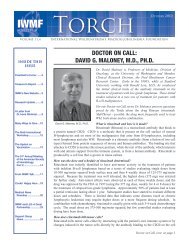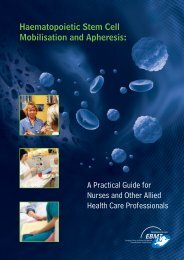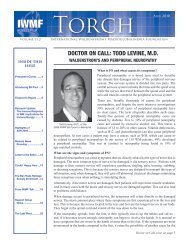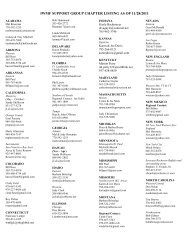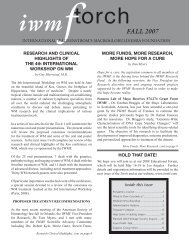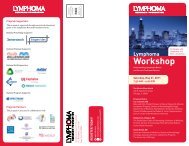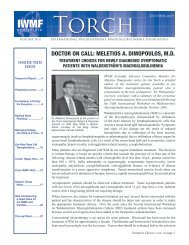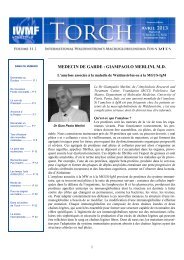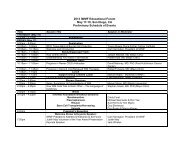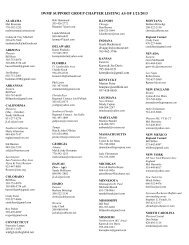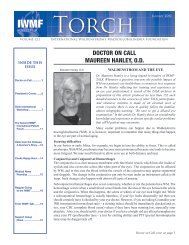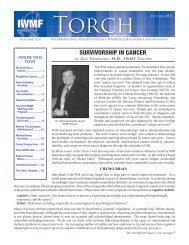Spring 2008 - International Waldenstrom's Macroglobulinemia ...
Spring 2008 - International Waldenstrom's Macroglobulinemia ...
Spring 2008 - International Waldenstrom's Macroglobulinemia ...
Create successful ePaper yourself
Turn your PDF publications into a flip-book with our unique Google optimized e-Paper software.
PRESIDENT’S CORNER<br />
by Judith May<br />
For this edition of President’s Corner I would like to share with you some recent information I’ve<br />
gleaned from resources available for cancer patients. I hope you find this useful.<br />
Sixth Annual Cancer Survivorship Series: Living With, Through & Beyond Cancer<br />
A three-part telephone education workshop program presented by CancerCare in collaboration with<br />
the National Cancer Institute, the Lance Armstrong Foundation, the Intercultural Cancer Council,<br />
Living Beyond Breast Cancer, and the National Coalition for Cancer Survivorship.<br />
This free series offers cancer survivors, their families, friends, and healthcare professionals practical<br />
information to help them cope with concerns and issues that arise after treatment ends.<br />
Part I April 22: The Importance of Communicating with Your Doctor About Follow-Up Care.<br />
Part II May 13: Rediscovering Intimacy in Your Relationships Following Treatment<br />
Part III June 24: Survivors Too: Family, Friends and Loved Ones<br />
All of the workshops take place from 1:30 to 2:30 pm Eastern Time.<br />
These workshops are free – no phone charges apply, but pre-registration is required. To register simply go to the CancerCare<br />
web site www.cancercare.org/TEW<br />
Use of Vitamin and Mineral Supplements Among Cancer Patients<br />
Researchers have found that, while vitamin and mineral supplement use is widespread among cancer patients and survivors,<br />
up to 68% of physicians may not know when their patients are using them. The finding highlights the need for doctors to<br />
discuss supplement use with their cancer patients, and vice-versa.<br />
PAGE 4<br />
Many cancer patients and survivors believe that vitamin supplements can reduce treatment side effects, decrease the chances<br />
of cancer recurrence, and improve their survival. However, studies addressing these topics are inconsistent or inconclusive—<br />
and many doctors worry that supplements can interact with cancer treatments or have other unintended consequences.<br />
Drs. Christine M. Velicer and Cornelia M. Ulrich of the Fred Hutchinson Cancer Research Center wanted to investigate<br />
how widespread this problem might be. With funding from NIH’s National Cancer Institute (NCI), the researchers analyzed<br />
32 studies published between 1999 and 2006 that addressed vitamin and mineral supplement use among U.S. adult cancer<br />
patients and survivors. Their results were published in the February 1, <strong>2008</strong>, issue of Journal of Clinical Oncology.<br />
The researchers found extensive supplement use among cancer patients and survivors. In studies combining data from<br />
different types of cancer, 64-81% of survivors reported using some kind of vitamin or mineral supplements, and 26-77%<br />
reported taking multivitamins. Breast cancer survivors reported the highest use, with consumption of any vitamin or mineral<br />
supplements ranging from 67% to 87%, and multivitamin use ranging from 57% to 62%. In comparison, about half of all<br />
adults in the US take vitamin or mineral supplements, and about a third use multivitamins.<br />
The researchers also found that between 14% and 32% of survivors started using supplements after their diagnosis. Women<br />
and people with higher levels of education were more likely to use supplements. Strikingly, the study found that 31-68% of<br />
cancer patients and survivors who use supplements may not discuss it with their doctors.<br />
“Knowing about supplement use is crucial for doctors,” Ulrich explained. “Some vitamins, such as folic acid, may be<br />
involved in cancer progression while others, such as St. John’s Wort, can interfere with chemotherapy. However, we really<br />
need more research to understand whether use of these supplements can be beneficial or do more harm than good.”<br />
This study highlights the need for more research into how dietary supplements affect cancer treatment, survival and quality<br />
of life. To that end, NCI is currently conducting a number of clinical studies into different food components, many provided<br />
as dietary supplements, to determine their impact on cancer prevention and therapy. In the meantime, it’s important for<br />
doctors and cancer patients to discuss any supplement use.<br />
Related link: Cancer Care. Go to www.cancer.gov and select 'Cancer Topics' and search 'nutrition'<br />
President's Corner, cont. on page 16



